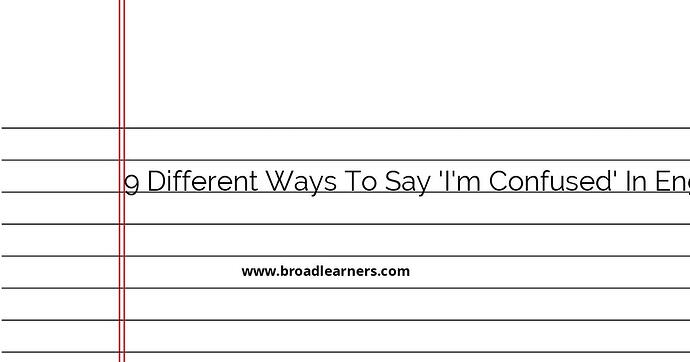Being confused is a common feeling that we all experience from time to time. When we're unsure or don't understand something, it's important to be able to express our confusion effectively. If you're tired of always saying "I'm confused," here are nine different ways to express your confusion in English:
- I'm unsure
- I'm puzzled
- I'm baffled
- I'm perplexed
- I'm mystified
- I'm at a loss
- I don't get it
- I'm not sure what you mean
- I'm having trouble understanding
Using alternative expressions for "I'm confused" can help diversify your vocabulary and convey your feelings more precisely. Let's take a closer look at each of these expressions and how they can be used:
1. I'm unsure
When you're unsure about something, it means you don't have a clear understanding or definite answer. This phrase is appropriate when you're uncertain and need more information or clarification. For example:
I'm unsure about which direction to take.
2. I'm puzzled
If you're puzzled, you're finding something difficult to understand or explain. It suggests a sense of curiosity and confusion. For example:
I'm puzzled by the instructions. They're not clear to me.
3. I'm baffled
Being baffled means you're confused or perplexed and unable to understand or explain something. It implies a higher level of confusion and might be used when something makes no sense. For example:
I'm completely baffled by the solution to this problem.
4. I'm perplexed
When you're perplexed, you're confused and uncertain about something. It suggests a state of being puzzled and unable to figure something out. For example:
I'm perplexed by the results of the experiment. They don't match our expectations.
5. I'm mystified
If you're mystified, you're completely bewildered or puzzled by something that you can't comprehend. It implies a sense of wonder and confusion. For example:
I'm completely mystified by the magic trick. I have no idea how it's done.
6. I'm at a loss
Being at a loss means you're unable to understand or explain something, and you feel helpless or confused. It suggests a lack of knowledge or cluelessness. For example:
I'm at a loss for words. I don't know how to respond to your question.
7. I don't get it
This phrase is straightforward and common. It is used when you don't understand something and want it explained in a simpler way. For example:
I don't get it. Can you explain it again?
8. I'm not sure what you mean
If you're not sure what someone means, it means you don't understand their words or intentions. This phrase can be used when you need further clarification. For example:
I'm not sure what you mean by "deadline." Could you please explain?
9. I'm having trouble understanding
When you're having trouble understanding, it means you're finding it difficult to comprehend or make sense of something. This phrase can be used when you're struggling to grasp a concept or idea. For example:
I'm having trouble understanding this chapter of the book. It's quite complex.
By using these alternative expressions, you can vary your language and effectively convey your confusion. Remember to choose the expression that best fits the context and degree of your confusion. Practice using these phrases to expand your vocabulary and enhance your communication skills.
Did I miss anything? Respond below
